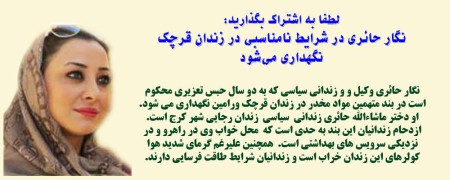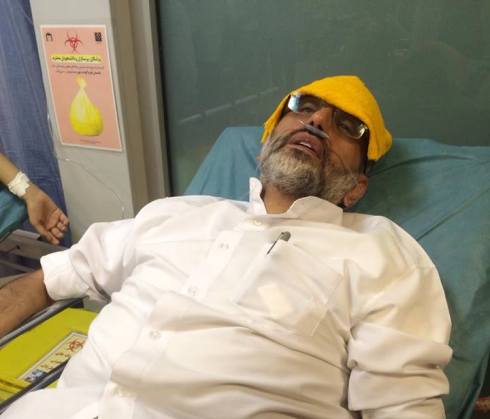
Prominent women’s rights and student activist, Bahareh Hedayat has written a letter from prison to her husband Amin Ahmadian.
Bahareh penned this letter after finding out that despite the fact that under the new Penal Code she had completed her sentence, and a release order had been issued for her by the Court of Appeals, the prosecution illegally had kept her in prison and had illegally enforced a two year suspended sentence which dates back to 2007.
Following is the translation of Bahareh Hedayat’s letter to her husband Amin:
It was in the afternoon, I was sleeping, a sleep as if you put your body in a corner and told it, “Stay right here, I’ll be right back”, and then you yourself went wandering in the alleys of your mind’s imagination; imagining a simple life…
“Get up Bahar, you must go to the sentence enforcement office”.
While my body got dressed and went down the stairs, I myself also reached the bottom of the stairs & said, “We’ll go in together….”
In the sentence enforcement office they showed me a hand written letter that said my release order had been issued four days ago, and just today my two years suspended sentence was enforced….
I am sitting down and looking at the letter but my body is standing up speaking with the man behind the desk: “My release order was sent here on Saturday and you did not implement it?! Then under what sentence have you kept me here in the last 4 days? By a collective magic trick?”
“This is illegal sir!” No not illegal, it’s a fraud affecting our lives….Just as usual.
“See Mrs. Hedayat, even if they had released you, with this same sentence, they would have re-arrested you, so what would have been the point?”
“No they couldn’t have, it had legality issues”…
“How long is two years, Amin? How many missing you? How many wandering around? Anyhow, it’s not mister so and so’s fault either. They have given him instructions, he is just following orders.
I get up and go stand by the window…You are somewhere out there, somewhere close, in one of those streets…
“I will file a complaint about this man”.
“You have the right to file complaint about anyone you wish”…and then he laughs. And I think about our lives.
“See my dear, the prosecution had initiated this case in mid June, and a few days would have not made any difference.”
If our lives had a shape, it would have been a sine curve. A tangent graph with two irrelevant axes. An axis that moves step by step; 4, 5/4, 5, do you see the line? You can see the beginning and the end: 6, 7, 8; Step by step, point by point, year by year.
I put my finger on 6 and draw a line to 8: two numbers, two years: one can read books, can write, can translate, you can even play around the entire time.
Even if you don’t do anything, the time will pass. But that one is a scary axis, a progressive continuity. An endless line with no visible end to it, it seems that it goes to the deepest part of the chambers of the heart, to all the invisible yearnings, home, light, routines, countless small dreams.
The teacher says, “leave it be, there is no end to it, it’s infinite, an endless line has no number”.
I hear the Judge’s voice from afar, clean cut, & prayers performed, “Well this is it, goodbye”.
I think about you, and all the light switches that you will have to turn on by yourself….
The teacher says, “The weight of your change is in this axis…it has no numbers…you can only imagine it”.
The office hour is over, the prison compound is quiet, everybody is on the way back to their homes: “Is there anything you want?” They get some fruit, bread, tomatoes…
“I am here”,
“You are back”…
Weightless words, a simple joy, and a voice that asks, and a voice that answers, in a home with lights turned on…
Where are you now Amin? How have you been enduring this, damn it?…
“Let’s go Mrs. Hedayat”. My body and the guard are going back to the ward…I remain behind right here…by the window…in the alleys of my imagination…
Bahareh Hedayat
Evin prison
August 22, 2015
Source: Keleme







